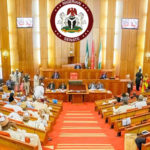S INCE you didn’t study arts in tertiary institution, how did you develop the skill which you are now surviving on today?
I am a divine self-taught artist, as well as a graduate of History and International Relations from the Lagos State University (LASU). I never attended any arts class in the physical, apart from the handwork trainings I had during my primary school level (art crafts). I started with bone collage medium, driving it to the highest level where I use cow horn to achieve portrait pictures. It was from there that I discovered other styles, and today, I am into arts and painting fully. As a result of what I am doing, I’ve appeared on several recorded and live shows on television. I’ve also been interviewed several times by print journalists that I have lost count. In fact, I’ve done so many commissioned works here in Nigeria and abroad.
With the fact that you are a self-taught artist, it means you were so passionate about art before delving into it fully?
Definitely, my passion has also made me to expand to new frontiers in visual arts, but more importantly, arts should be seen as something to occupy and provide a forum, platform for dialogue and contemplation and evangelism, like what I have been doing with other previous media-bone collage, mix-media, metal fabrication. This new medium has been very interesting and challenging.
Do you think your contribution to arts will stand the test of time, because there are several other artists coming up with different art styles everyday?
Having been practising arts for more than 27 years, I have gained enough knowledge to think and create a medium that will stand the test of time. I call my new style ‘Graven Painting,’ and the material has to be glued to either board or canvas panel to create a relief format. First, I sketch, provide the materials, engrave the materials before I glue them to either the board or canvas panel to create a super relief effect. Then I prime the materials on the panel; I then allow them to dry before I start applying colours to them, and at the end of the day, one creates a super and unique work.
The medium is unique because of the richness and solidity of the materials and the colour effect of impasto rendition. I can achieve any concept with the medium, and though interesting, it is very challenging. One has to put his head down to create a work that is of international standard.
Some artists believe that government can support the visual arts sector to generate revenue in view of the dwindling oil price in the international market. Do you think this is feasible?
I have, in the past, advocated for the diversification of our economy. I had given interviews on the need for government to place embargo on importation of foreign arts. No serious economy will want to undermine the importance of its creative industry, which visual arts play a vital role. Nigeria’s total dependency on oil has brought about instability. However, all hands must be on deck towards evolving and supporting an alternative economic platform for the country to lean on for survival. In fact, the visual arts can serve as an alternative income earner for government. We just need the right policies by government to make this happen.
Unfortunately, the Nigeria government, from inception, has not taken the development of the arts sector as vital platform for the re-engineering of the national economy seriously. My appeal to government, banks and investment institutions is that they should invest in the arts sector.
I hereby advocate that there should be an arts investment fund that sees arts solely as an asset, while seeking to provide investors with exposure to the benefit of an appreciating market.
Furthermore, government should also give tax incentives to any hospitality business, organisation and private companies that encourage artists with their art patronage. By so doing, artists will be encouraged. This will also help in reducing unemployment in this sector.
How important is visual arts in the society?
I believe arts, particularly visual arts, should be taught to every Nigerian child. In fact, we should make it compulsory in our schools. Teaching visual arts to our children will help develop their creative thinking and by the time they reach adulthood, they will think differently and add value to the society.






